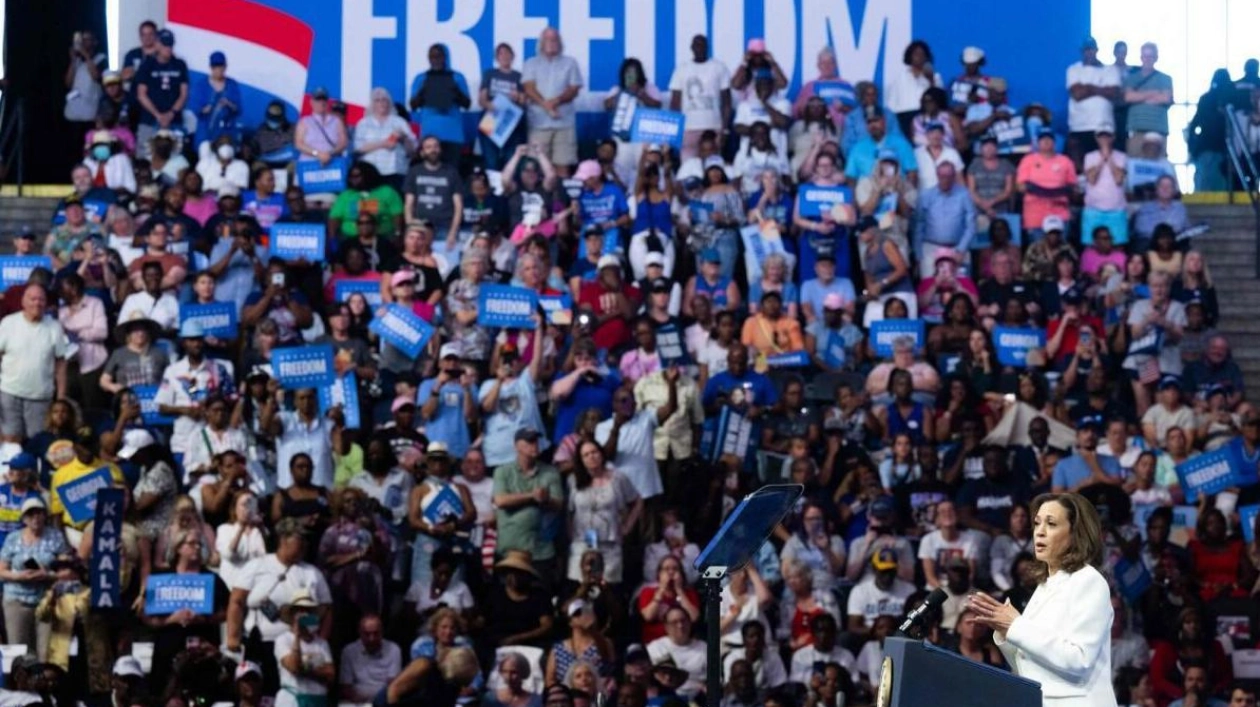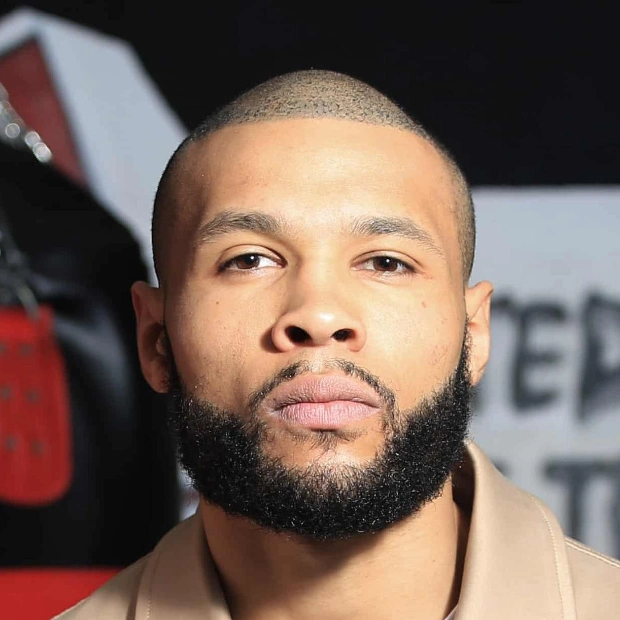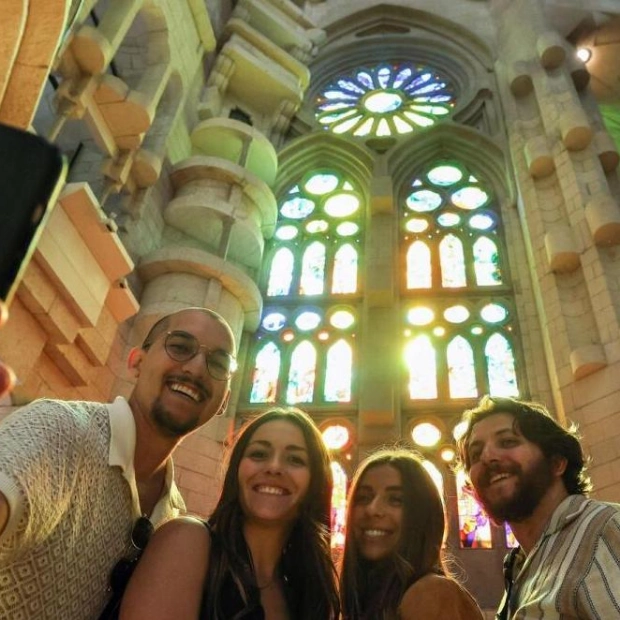Vivian Childs, a fervent advocate for Donald Trump, recently instructed a gathering of Republicans on strategies to attract Black voters in the pivotal state of Georgia. The Black Baptist minister emphasized the importance of highlighting Trump's economic policies, illegal immigration, and inflation to the assembled volunteers and campaign staff at the ex-president's newly inaugurated office in the rural city of Valdosta last month. Childs urged the audience to communicate to voters the tangible benefits Trump has delivered and his commitment to the change America requires. "We are the party of hope," she declared. "We are the party of truth." The atmosphere at the office, a stately structure with white pillars and porches, was charged with urgency. Trump himself has acknowledged Georgia's critical status, a state he believed he had secured until Kamala Harris emerged as his Democratic challenger in July. Harris's entry into the race sparked a surge of public excitement, and polls in Georgia now show the candidates in a dead heat, a stark contrast to early July when Trump led Democratic President Joe Biden by as much as six percentage points.
A fierce contest is underway for the Black voters who constitute a third of Georgia's population, the largest proportion among the seven battleground states that will determine the outcome of the November 5 presidential election. Trump's ambition to garner more Black support has been complicated not only by Harris's nomination but also by Republican-backed voting restrictions that activists argue are designed to erect barriers for people of color—a claim the party denies. Childs, a member of the national "Black Americans for Trump" coalition, acknowledged that Harris's nomination initially altered the dynamics of the race in Georgia. "There was a lot of excitement, absolutely," she said. "She's Black and a woman." However, Childs maintained that this enthusiasm was waning. "We must cease dividing our country based on appearance," she added. "I advise people to address Black voters in the same manner they do White voters: examine President Trump's record, his policies, and what he has accomplished for all Americans."
Reuters interviewed three dozen campaign officials, party chairs, local activist groups, and allies supporting both Trump and Harris to gauge each candidate's campaign efforts in the closely contested state that Trump narrowly lost to Biden by fewer than 12,000 votes in the 2020 election. A senior Trump campaign official, who requested anonymity to discuss confidential matters, revealed that the team sees potential in appealing to young Black men who are disillusioned with Democrats due to high prices and perceive greater economic prospects under the former president. Both campaigns are actively courting Black voters through various channels—churches, county fairs, door-to-door interactions, social media, and broadcast media. This voting bloc has traditionally leaned heavily Democratic, but Trump has been making inroads, according to opinion polls.
In Cobb County, a sprawling region outside Atlanta, the Democratic Party chair, Essence Johnson, a Black woman, noted the intensifying competition. "It has gotten really intense in Georgia," she said. At the Pig and Peaches barbecue festival in Cobb County, the battle lines were clearly drawn. The Democratic stall targeted voters of color with literature on student loan forgiveness, support for historically Black universities, and drug price reductions. In contrast, the Republican stall, located a hundred yards away, featured Spanish-language leaflets and literature focused on inflation, abortion, economic opportunity, and faith. "Many African Americans, Asians, and Hispanics share these values," said Salleigh Grubbs, the Republican county chair, who has been organizing events in schools and holding house parties and door-knocking in predominantly Black neighborhoods in the more racially diverse southern part of the county.
Cobb County exemplifies the demographic shifts that have transformed Georgia from a reliably Republican state into a battleground. Once predominantly white and Republican, it is now 30% Black, 14% Hispanic, and 6% Asian, contributing to Biden's victory in Georgia in 2020. Johnson, the Cobb County Democratic chair, observed that Harris's entry into the race had significantly shifted the landscape. "It's a reflection in the mirror for a lot of us," she said of Harris. A Black men's forum held just before Biden ended his re-election bid on July 21 drew 14 attendees, but 125 people showed up for another held just after Harris entered the race. Sixty people marked a good crowd at county party meetings when Biden was the candidate; 235 people attended once Harris became the nominee. Before Biden dropped out, Trump's campaign was so confident of victory in Georgia that it had spent less than $3 million on ad buys. Since Harris's emergence, the campaign and an affiliated group responded by investing more than $30 million into advertising in the state, outspending the Harris campaign through the month of August.
Both sides have committed to spending over $37 million each in Georgia through Election Day, according to AdImpact, a firm that tracks political advertising. The Georgia Black Republican Council, which has endorsed Trump, is launching ads on Black radio stations in eight metro areas, focusing on immigration, the economy, and opposition to abortion, said Camilla J. Moore, the council's chair. Ads from the Trump campaign are predominantly negative, attacking Harris for inflation, blaming her for illegal crossings at the US-Mexico border, and accusing her of being a dangerous liberal. Janiyah Thomas, Black media director at the Trump campaign, highlighted the former president's proven track record of creating opportunities for the Black community. "To every Black American struggling to make ends meet, our message is clear: vote for the candidate who has consistently delivered on promises," she added. In August and September 2019, while Trump was president, the Black unemployment rate reached a new low of 5.3%. Under Biden, the rate fell even lower, to 4.8%, in 2023.
Harris is running ads focused on proposals to lower drug prices, tax large corporations and the ultra-wealthy to fund housing, and provide tax breaks for working parents. Harris's campaign stated it has been reaching out to Black voters across Georgia "since day one." "Vice-President Harris is fighting to lower costs for our families, protect our freedoms, and ensure everyone in Georgia can not just get by, but get ahead," added Porsha White, the campaign's state director. Trump secured about 11% of the Black vote in Georgia in the 2020 election, according to exit polls. If he were to increase his share in November, he could win the state, said Andra Gillespie, a political science professor at Emory University. A poll conducted for CNN during the last week of August showed Harris with a one-percentage-point lead in the state, 48-47%, with Trump receiving 10% of the Black vote. A Trump victory in Georgia would alleviate the pressure for him to win all three of the midwestern battleground states—Michigan, Pennsylvania, and Wisconsin. However, he risks alienating some voters with his inflammatory comments about Harris, a woman of Black and South Asian heritage. Trump has questioned the vice president's racial identity.
"God help our souls if Trump wins the election," said Demetrious Hall Sr., 62, a Black voter in Savannah who denounced Trump's racist rhetoric and declared his support for Harris. Trump's ally Childs dismissed such comments in an interview following the Valdosta volunteer meeting, citing his economic policies that reduced Black unemployment, support for historically Black colleges and universities, and crackdown on illegal immigration as reasons to support him. Asked how she responds to voters who claim Trump is racist, Childs said: "I say, 'Based on what?'" Georgia's Governor Brian Kemp demonstrated that a Republican can increase his share of the Black vote in 2022, when he defeated a Black Democrat, Stacey Abrams, partly due to a seven-percentage-point jump in Black voter support from their first match-up in 2018. Kemp focused on the economy and gun rights, said his former campaign manager, Bobby Saparow. Bruce LeVell, a Black businessman from Atlanta, noted that Trump's message on pocketbook issues resonated with voters of color. "Black men especially and some of the women are really taking a look at their wallets," said LeVell, who hosted a roundtable of Black business owners with Trump when he visited Atlanta in early August.
At the Embassy church in Austell in southern Cobb County, senior pastor B. Dwayne Hardin is also spreading the gospel of conservatism. At a recent service kicked off with an hour of boisterous gospel songs, Hardin told his Black congregation that America is heading towards socialism, that children are being indoctrinated in schools, and the country "is full of terrorists." He emphasized the importance of voting for people who "shake things up." In his private office, Hardin clarified that he does not explicitly tell people to vote for Trump, but that Trump aligns with issues such as individual liberty, school choice, and economic empowerment. "Do not worship the idol of skin color," he said he tells his congregation.






